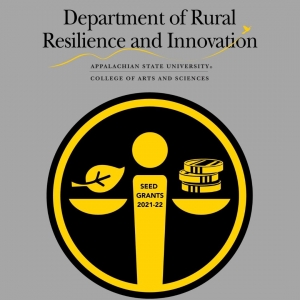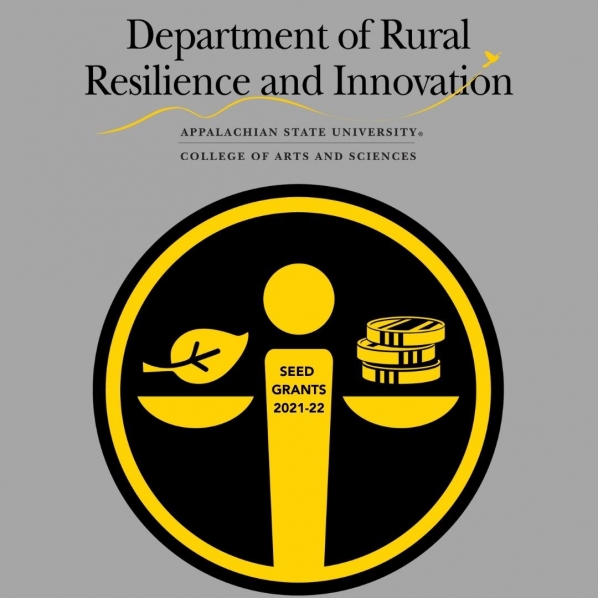The newest Department in the College of Arts and Sciences, the Department of Rural Resilience and Innovation (RRI) in partnership with Research Institute for Environment, Energy and Economics (RIEEE) has awarded seed grants to five collaborative research projects at $5,000 each for a total of $25,000. The seed grants were established to help fund research or service-learning class collaborations that aid in innovating rural health, resilient growth and rural-urban interdependence.
The Department of Rural Resilience and Innovation is housed in Appalachian State University’s College of Arts and Sciences and was created to build partnerships with rural stakeholders and to share university resources to provide a mainframe for those involved with rural community partners across the university. RIEEE facilitates opportunities for multidisciplinary research and scholarship to foster a deeper understanding and appreciation for how the sustainable use of our social, cultural, economic and natural capital positively impacts society.
“We had outstanding proposals from across the university and were able to team up with RIEEE to fund projects from multiple colleges. The faculty behind these projects are already doing great work and we’re excited to see how their future work will complement the existing strengths of their home departments,” said Dr. Mike Madritch, interim dean, College of Arts and Sciences.
Seed Grant projects for 2021-22 include the following:
Regional public sector organizations and their roles in rural broadband deployment
The project team: Dr. Jay Rickabaugh, Department of Government and Justice Studies and Dr. Jennifer Luetkemeyer, Department of Leadership and Educational Studies.
The gap in broadband access between rural and non-rural communities is an issue that was strongly highlighted by the COVID-19 pandemic. The project goal is to investigate Regional Public Sector Organizations (RSPO) like government councils, educational service agencies and regional library systems on how they work with their local government institutions to create broadband infrastructures.
The group hopes to highlight the work that RSPOs conduct, and how they assist in improving the quality of life within the community. With state and federal funding being used to fix the broadband gap between rural and non-rural communities, RSPO’s can be used to implement these fixes in an efficient manner.
Grassroots sustainability and resiliency in Appalachia: protecting regional watersheds and growing local/global environmental knowledge
The project team: Dr. Julie Shepherd-Powell, Department of Interdisciplinary Studies and Dr. Savanna Murray, Department of English.
By examining how regional activists in southwest Virginia associate protecting local watersheds with global climate change, this project aims to co-construct a mutually beneficial system with the community. They plan to add to an evolving list of work that links local and global environmental sustainability with aiding communities in creating resilient solutions to environmental problems.
Assessing influencing factors of resilience and professional burn-out in rural registered nurses in North Carolina
The project team:
- Dr. Rebecca Turpin, Department of Nursing
- Dr. Heather Venrick, Department of Nursing
- Dr. Rebecca Liljestrand, Department of Health and Exercise Science
- Dr. Rebecca Battista, Department of Health and Exercise Science
- Dr. Rich Christiana, Department of Health and Exercise Science
- Dr. Joy James, Department of Recreation Management and Physical Education.
The goal of this project is to create a resilience intervention (protecting participants against the development of mental dysfunctions in relation to stressor exposure) survey to analyse the resilience factors and burnout levels of rural hospital nurses.
The data gained from the survey will be used to provide better resilience-building strategies in order to support nurses in rural areas. Hospitals will be surveyed according to nursing turnover rates and collaborations will be created with regional hospitals to develop a pilot resilience intervention study as well as a nurse resilience mobile app.
Addiction and recovery in rural western North Carolina: A community-based project
Project lead: Dr. Cameron Lippard, Department of Sociology
This project will focus on diversity and inclusion service issues within Wilkes County. Wilkes Recovery Revolution focuses on offering addiction treatment to recovering individuals. However, the organization has struggled with assisting the minority populations within the county. To assist with this issue, the Department of Sociology has collaborated with Wilkes Recovery Revolution to form a community-based partnership in order to increase racial and ethnic minority participation in the programming.
The partnership focuses on providing research to highlight addiction issues among non-white populations, workshop assistance to offer better inclusivity programs as well as creating research reports and action plans to improve minority participation within the community.
Expanding agricultural entrepreneurship and employment for veterans through community partnerships
The project team: Dr. Tammy Kowalczyk, Department of Accounting; Dr. Maureen MacNamara, Department of Social Work and Dr. Elizabeth Shay, Department of Geography and Planning.
The goal of this project is to demonstrate the importance of a multidisciplinary approach in building community resilience by implementing Frontline to Farm (F2F), a veterans’ workforce development initiative, at The Patterson School Foundation.
This project will highlight how effective partnerships can be utilized to meet community needs while also sharing financial and human resources in a way that reduces the reliance of social programs. The multidisciplinary research team will create a framework that assists in implementing the F2F initiative in a setting that offers education, training and entrepreneurial startups for veterans and new farmers while also providing an experimental learning opportunity for students in the form of internships.
###
About the Department of Rural Resilience and Innovation
The goal of the Department of Rural Resilience and Innovation — a unit within the College of Arts and Sciences at Appalachian State University — is to sustain partnerships with rural stakeholders and collaborate with colleagues doing engaged work to offer value-added experiences for students. The department functions as a hub for those working on scholarship, teaching and service with rural community partners. Learn more at https://rri.appstate.edu.
About the Research Institute for Environment, Energy, and Economics
Since 2008, Appalachian State University’s Research Institute for Environment, Energy, and Economics (RIEEE) has fostered interdisciplinary research on the environment, energy and economics, especially the areas in which these subjects intersect. The institute serves as an umbrella organization for three centers: the Appalachian Energy Center, Center for Economic Research and Policy Analysis (CERPA) and the Southern Appalachian Environmental Research and Education Center (SAEREC). The work supported by RIEEE is integrated into Appalachian’s academic programs, used to facilitate discovery among K-12 student students and teachers, and employed in the region’s economic development. Learn more at https://rieee.appstate.edu.
About the College of Arts and Sciences
The College of Arts and Sciences (CAS) at Appalachian State University is home to 17 academic departments, two centers and one residential college. These units span the humanities and the social, mathematical and natural sciences. CAS aims to develop a distinctive identity built upon our university's strengths, traditions and unique location. The college’s values lie not only in service to the university and local community, but through inspiring, training, educating and sustaining the development of its students as global citizens. More than 6,400 student majors are enrolled in the college. As the college is also largely responsible for implementing App State’s general education curriculum, it is heavily involved in the education of all students at the university, including those pursuing majors in other colleges. Learn more at https://cas.appstate.edu.
By Ellen Gwin Burnette
Nov. 3, 2021
BOONE, N.C.

